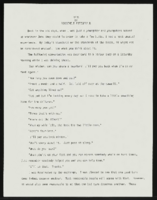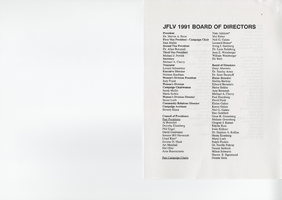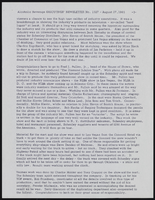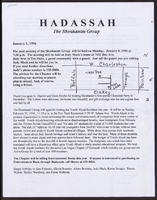Search the Special Collections and Archives Portal
Search Results

"Reds": article draft by Roosevelt Fitzgerald
Date
Archival Collection
Description
From the Roosevelt Fitzgerald Professional Papers (MS-01082) -- Drafts for the Las Vegas Sentinel Voice file. On Americans welcoming Russians with VIP treatment, while minorities continue to be mistreated.
Text

Transcript of interview with Jan Kennedy by Barbara Tabach, September 7, 2011
Date
Archival Collection
Description
Jan Kennedy was born (1924) Janet Parmelee, the daughter of a Connecticut physician and a homemaker. In high school she met Norman Kennedy, who she would marry after both had attended college and to whom she was married for 64 years. Until 1963, their roots seemed to be taking hold in the Seattle area. That is until Norm was offered an attractive career opportunity as a weather man at the Nevada Test Site. They settled in and enjoyed a zest-filled life with their four sons and a dynamic group of friends who they often entertained at their cabin in Mount Charleston. In addition, Jan managed to volunteer for a list of organizations including UMC Hospital/Southern Nevada Memorial Hospital; Clark County Museum Guild; Salvation Army Women's Auxiliary; church deacon; Assistance League; Red Hats—keeping herself ever busy and joyfully satisfied.
Text
Elgin Holbert Jr. oral history interview
Identifier
Abstract
Oral history interview with Elgin Holbert Jr. conducted by Claytee D. White on April 28, 2021 for African Americans in Las Vegas: a Collaborative Oral History Project.
Elgin Holbert Jr. discusses growing up in the Westside community of Las Vegas, the activities he participated in as a child, community leaders he admired, and his observations of mixed family life (as his father was Black and his mother was white). Elgin also speaks of his work as a Red Cap on the Union Pacific Railroad (UPR), his time at Nevada Power, and his experience dealing cards at various Las Vegas casinos including the Riviera Hotel and Casino (for 15 years), the Tropicana Las Vegas (for 15 years), and the Treasure Island Hotel (for 20 years).
Subjects discussed include: Viola Cunningham; Union Pacific Railroad; Riviera Hotel and Casino; Tropicana Las Vegas Hotel Casino; Treasure Island Hotel; Cotton Bowl; Jimmy Gay; Jefferson Recreational Center; and Eleanor Walker
Archival Collection

Patricia Vazquez interview, November 14, 2018, June 14, 2019: transcript
Date
Archival Collection
Description
Session 1: Interviewed by Marcela Rodriguez-Campo. Barbara Tabach also participates in the questioning. Session 2: Interviewed by Rodrigo Vazquez. Monserrath Hernandez also participates in the questioning. Patricia Vazquez was born and raised in Las Vegas, NV and shares her experiences growing up in the Valley as a Queer Latina. At a young age, she remembers traveling back and forth between Mexico and the U.S. to visit family. When she started school she shares how her home language, Spanish, became her family's "secret language" as she began to learn English. During elementary school Patricia was tracked into the special education program, and remove from the mainstream classroom. She would find her love for learning in books and libraries as she taught herself how to read in English. Despite being tracked into less advanced courses, Patricia would end up taking AP/ Honors courses in high school after forging her favorite teachers signature, which changed her educational trajectory. After coming out to her family, Patricia went nearly a decade distanced from her mother and continued her college education at Arizona State University. There, she would complete a bachelors in painting and a masters in comparative literature. Her work with the Chicano Studies program at ASU helped her develop her Chicana identity and begin her involvement in social activism. In Las Vegas, she worked to fight for marriage equality and LGBTQ rights with the American Civil Liberties Union , and later with the Progressive Leadership Alliance of Nevada. She also conducted several lectures for the Latino Youth Leadership Conference on sexuality, gender, and homophobia for over a decade. She has served as an English Professor at the College of Southern Nevada for the last 20 years and is an avid hiker, traveler, and painter.
Text
Richard and Sheilagh Brooks Papers
Identifier
Abstract
The Richard and Sheilagh Brooks Papers (1919-2003) are comprised of materials collected during their tenure as professors of Anthropology and Archaeology at the University of Nevada, Las Vegas (UNLV). Included are correspondence, research papers, photographs, reports, books, article reviews, and student scholarship. There is also a file on reburial issues that contains correspondence and an amendment to Nevada State law regarding the handling of exhumed bodies.
Archival Collection
Southern Nevada Daughters of the American Revolution Records
Identifier
Abstract
The Southern Nevada Daughters of the American Revolution Records primarily document the activities of three Southern Nevada chapters of the National Society Daughters of the American Revolution from 1950 to 2024. The materials center around the records of three chapters from Southern Nevada: Old Spanish Trail, Francisco Garces, and Valley of Fire. Materials include administrative records, scrapbooks, photographs, news clippings, and correspondence about the activities of the Daughters of the American Revolution chapters. Mateirals also include some records and scrapbooks from the Nevada State Society of DAR.
Archival Collection

Jewish Federation correspondence, meeting minutes, and other records, item 41
Description
Annual report for the Jewish Federation of Las Vegas, January 1990-June 1991.



